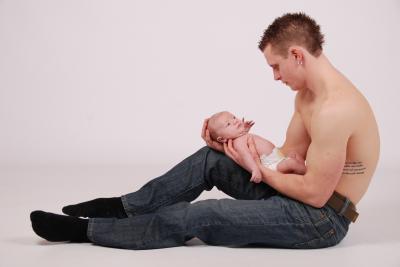
Studies are now showing that men, too, are hardwired to be caring parents - their testosterone levels drop significantly when they become fathers and their estrogen levels climb somewhat. There is also an increase in their level of prolactin, the nurturing hormone, and a rise in cortisol, which creates greater alertness and sensitivity to danger for their newborns. The increase in cortisol combined with the decrease in testosterone leads new fathers to avoid risky behaviors that could otherwise interfere with the responsibilities of parenthood.
Image: Louisa Stokes / FreeDigitalPhotos.net
The decrease in testosterone leads to physical changes that increase new fathers' abilities as caregivers and help them bond with their new infants: their immune system functions better, helping to avoid infections, their lower level of libido leads to a lesser urge to go out and reproduce, there are reduced levels of competition with other males, the risk of prostate cancer is reduced - and new fathers can even hear the cries of their infant more easily.So while macho men may attract us when we are single, it's their decrease in testosterone that keeps us together as a family unit, raising our children. It's nice to know that our husband's commitment to us and the kids is part of his evolutionary destiny.
How about your guy? Did you notice a change in his feminine side after the birth of your children? And if he's already become a grandfather, did you see another spurt when he began taking care of the grandkids? Jump in and use the comment button below.
On Wednesday we'll be hosting another Virtual Book Tour here on the blog. Please check back in then as we chat with Gayle Forman about her young-adult novels.

